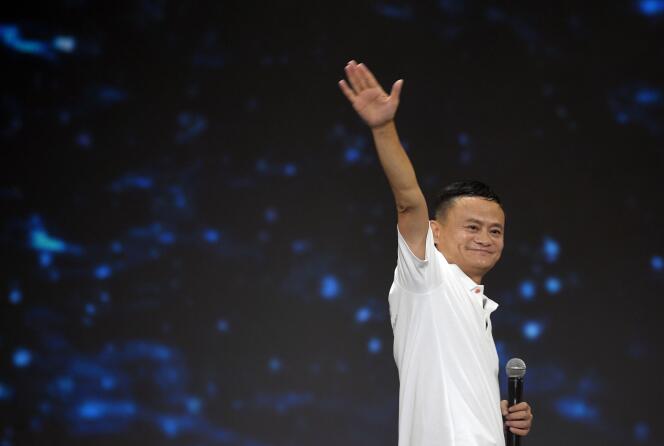https://www.lemonde.fr/en/china/art...arks-end-of-an-era-for-china_6033097_162.html
The split-up into six subsidiaries of the digital giant founded by Jack Ma is the consequence of a crackdown launched in 2021 by Beijing, but also marks the end of the unbridled growth of the Chinese economy.
By Simon Leplâtre(Shanghai (China) correspondent)
Published on June 17, 2023, at 4:45 pm (Paris), updated on June 17, 2023, at 6:42 pm
Time to 6 min.
Lire en français
Subscribers only


Jack Ma at Alibaba Group's 20th-anniversary event in Hangzhou, capital of China's Zhejiang province, on September 10, 2019. JIN LIANGKUAI / XINHUA / MAXPPP
For his return to China at the end of March, after more than a year's absence, Jack Ma, the founder of Chinese digital giant Alibaba, chose to keep a low profile. Only a short article published by a school on the Alibaba campus in Hangzhou on March 27 announced his presence in the country. It showed him wearing a white sweatshirt, cap and tracksuit trousers and saying a few admiring words about the children's work.
However, after three years under the radar, nearly a year of which was spent abroad, the confirmation of the return of the prodigal son of Chinese entrepreneurship was seen as symbolic. Wracked by a campaign against tech giants and three years of ultra-strict zero-Covid-19 policy that brought entire sectors of the economy to their knees, Chinese business leaders took it as a message of hope, a sign sent by Beijing to try and convince people that the Asian leader is open for business.
Three days after the former English teacher's visit to the Alibaba school, the company made a major announcement. China's number one online retailer − which is present in most sectors of the digital economy, generates sales of 868 billion yuan (€112 billion) and is used by more than 900 million Chinese every year − will split its various business ventures into six independent subsidiaries: the main one for online retail and others for the cloud, logistics, entertainment, international and other local services (meal delivery, maps, etc.).
Dismantling of Alibaba empire marks end of an era for China
The split-up into six subsidiaries of the digital giant founded by Jack Ma is the consequence of a crackdown launched in 2021 by Beijing, but also marks the end of the unbridled growth of the Chinese economy.
By Simon Leplâtre(Shanghai (China) correspondent)
Published on June 17, 2023, at 4:45 pm (Paris), updated on June 17, 2023, at 6:42 pm
Time to 6 min.
Lire en français
- Share Share
- Share on Twitter
- Share on Messenger
- Share on Facebook
- Share by email
- Share on Whatsapp
- Share on Linkedin
- Copy link
Subscribers only


Jack Ma at Alibaba Group's 20th-anniversary event in Hangzhou, capital of China's Zhejiang province, on September 10, 2019. JIN LIANGKUAI / XINHUA / MAXPPP
For his return to China at the end of March, after more than a year's absence, Jack Ma, the founder of Chinese digital giant Alibaba, chose to keep a low profile. Only a short article published by a school on the Alibaba campus in Hangzhou on March 27 announced his presence in the country. It showed him wearing a white sweatshirt, cap and tracksuit trousers and saying a few admiring words about the children's work.
However, after three years under the radar, nearly a year of which was spent abroad, the confirmation of the return of the prodigal son of Chinese entrepreneurship was seen as symbolic. Wracked by a campaign against tech giants and three years of ultra-strict zero-Covid-19 policy that brought entire sectors of the economy to their knees, Chinese business leaders took it as a message of hope, a sign sent by Beijing to try and convince people that the Asian leader is open for business.
Three days after the former English teacher's visit to the Alibaba school, the company made a major announcement. China's number one online retailer − which is present in most sectors of the digital economy, generates sales of 868 billion yuan (€112 billion) and is used by more than 900 million Chinese every year − will split its various business ventures into six independent subsidiaries: the main one for online retail and others for the cloud, logistics, entertainment, international and other local services (meal delivery, maps, etc.).
